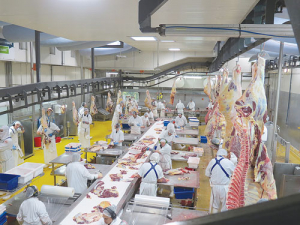Callaghan Innovation: Connecting industry problems with startup solutions
Gaining exposure to relevant innovation, "without being swamped in the sheer volume of options", is one of the main challenges for winegrowers considering agrictech.
 New technologies have potential to provide and export and tracking service for high-quality food producers.
New technologies have potential to provide and export and tracking service for high-quality food producers.
Blockchain and distributed ledger technologies have the potential to help our primary industries capture high-value niches, according to a new report.
They can help the sector connect more directly to consumers through supply chain innovations.
The report was commissioned by the Callaghan Innovation and blockchain venture studio Centrality.
The report ‘Distributed Ledgers and Blockchains – Opportunities for New Zealand’ by author Joshua Vial from entrepreneurial company Enspiral, outlined several blockchain initiatives now being used in the primary sector.
One example of primary sector work given in the December report is the AsureQuality Food Trust Framework.
NZ Post, AsureQuality (AQ) and NZ Trade and Enterprise have joined forces with Alibaba and local blockchain companies Trackback and Sylo to provide an export and tracking service for local, high-quality food producers.
“The project has been in development for over 14 months and is currently in a pilot phase. Chinese consumers consider fraudulent activity to be pervasive and a primary barrier to accessing safe food,” the report says.
“By scanning an AQ Assured Assurance Mark on their mobile phone a consumer can confirm their purchase is genuine and safe. Additionally, the project aims to connect NZ producers directly with Chinese consumers and remove intermediaries while maintaining high margins on premium products.”
The first participant is the HUI Maori collective to launch a broad offering of high-quality wine, manuka honey, natural snack bars and tonic water direct to Chinese consumers through an ecommerce platform.
The report says several projects here and overseas are focused on solving supply chain problems with distributed ledgers, which could have a significant impact on NZ’s primary industries.
NZ Post and Fonterra are also partnering with Alibaba to use blockchain technology to track consumers’ orders in an effort to increase food safety.
Centrality’s Trackback project is in live trials of a supply chain traceability solution to showcase NZ products in international markets.
Australian-based Blockgrain uses blockchain technology to help participants in the grain supply chain make better informed decisions, eliminate paperwork, reduce inefficiency and risk, open markets and increase profits.
Provenance is a blockchain company from the United Kingdom that is creating and fostering open, accessible information about products to transform the global economy. The company has completed pilot projects focused on tracing sustainably caught tuna and proving that farmers have received fair compensation.
Budou are being picked now in Bridge Pā, the most intense and exciting time of the year for the Greencollar team – and the harvest of the finest eating grapes is weeks earlier than expected.
The Real Estate Institute of New Zealand (REINZ) has released its latest rural property report, providing a detailed view of New Zealand’s rural real estate market for the 12 months ending December 2025.
Rural retailer Farmlands has released it's latest round of half-year results, labeling it as evidence that its five-year strategy is delivering on financial performance and better value for members.
OPINION: "We are back to where we were a year ago," according to a leading banking analyst in the UK, referring to US president Donald Trump's latest imposition of a global 10% tariff on all exports into the US.
DairyNZ says the Government’s proposed Resource Management Act reform needs further work to ensure it delivers on its intent.
Overseas Trade Minister Todd McClay says he's working constructively with the Labour Party in the hope they will endorse the free trade agreement (FTA) with India when the agreement comes before Parliament for ratification.